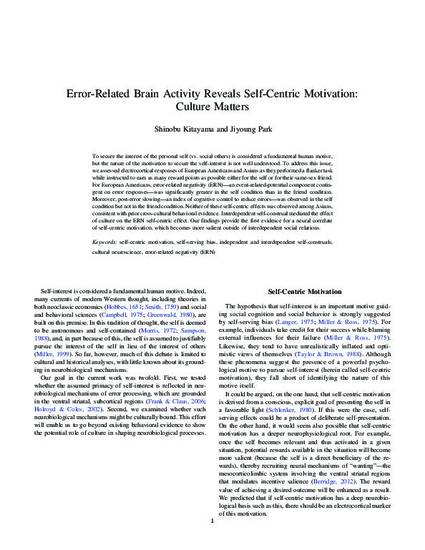
Article
Error-related brain activity reveals self-centric motivation: Culture matters
Journal of Experimental Psychology
(2013)
Abstract
To secure the interest of the personal self (vs. social others) is considered a fundamental human motive, but the nature of the motivation to secure the self-interest is not well understood. To address this issue, we assessed electrocortical responses of European Americans and Asians as they performed a flanker task while instructed to earn as many reward points as possible either for the self or for their same-sex friend. For European Americans, error-related negativity (ERN)-an event-related-potential component contingent on error responses--was significantly greater in the self condition than in the friend condition. Moreover, post-error slowing--an index of cognitive control to reduce errors--was observed in the self condition but not in the friend condition. Neither of these self-centric effects was observed among Asians, consistent with prior cross-cultural behavioral evidence. Interdependent self-construal mediated the effect of culture on the ERN self-centric effect. Our findings provide the first evidence for a neural correlate of self-centric motivation, which becomes more salient outside of interdependent social relations.
Keywords
- culture,
- motivation
Disciplines
Publication Date
Winter February 11, 2013
DOI
10.1037/a0031696
Publisher Statement
This article may not exactly replicate the final version published in the APA journal. It is not the copy of record.
Citation Information
Jiyoung Park and Shinobu Kitayama. "Error-related brain activity reveals self-centric motivation: Culture matters" Journal of Experimental Psychology Vol. 143 Iss. 1 (2013) p. 62 - 70 Available at: http://works.bepress.com/jiyoung-park/9/
